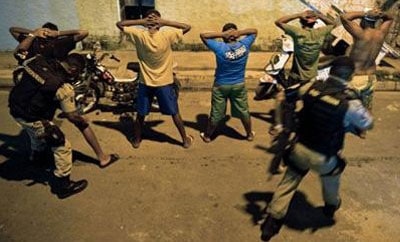A new study shows that northeastern Brazil is the region most affected by gun deaths in the country, having experienced a dramatic upswing in violence over the past decade.
The study, released by non-governmental organization the Brazilian Centre for Latin American Studies (Cebela) shows that over 36,000 Brazilians were killed by guns in 2010 — a rate of 20.4 people per 100,000. The rate is slightly below 2000 levels but nearly triple the rate of 1980. Nearly 95 percent of the 2010 gun deaths were murders.
Between 2000 and 2010, northeastern states like Alagoas, Paraiba, Bahia and the northern Amazonian state of Para suffered the greatest increases in firearm deaths (see map). Alagoas, for example, saw a 215 percent rise over that time period, and finished 2010 with a firearm death rate of 55 per 100,000 inhabitants, the highest in the country.
Meanwhile, the country’s southeastern economic hub — namely, the states of Rio de Janeiro and São Paulo — saw gun violence drop significantly over this 10-year period. The Rio de Janeiro firearm death rate fell nearly 44 percent, while São Paulo saw a 67.5 percent drop. 
The Cebela study tracks firearm statistics in Brazil from 1980 to 2010. The numbers are based on those kept by the government’s national statistics agency, known as the IBGE. According to the study, 70 percent of murders in Brazil are committed with firearms.
InSight Crime Analysis
The study confirms that Brazil’s violence, previously concentrated in major urban centers like Rio de Janeiro and São Paulo, has now become more widely dispersed across the country. Greater numbers of people arriving to northeastern cities looking for work has been cited as one explanation for the uptick in violence in the region. There have also been concerns that criminal organizations displaced from Rio de Janeiro and São Paulo have contributed to rising homicide rates.
Police also say that the spread of the crack cocaine trade has deeply affected cities like Maceio, Alagoas and led to increased drug-related murders. Crack cocaine is considered such a serious problem in Brazil that the government has pledged $2 billion to helping addicts and fighting drug trafficking.
The study’s findings also cast doubt on the efficacy of Brazil’s gun control initiatives. Since 2004, Brazil has been running nationwide gun amnesty schemes alongside tighter restrictions on the gun trade. However, according to the study, that period has seen the firearm death rate register only a tiny drop, from 20.7 per 100,000 down to 20.4.

